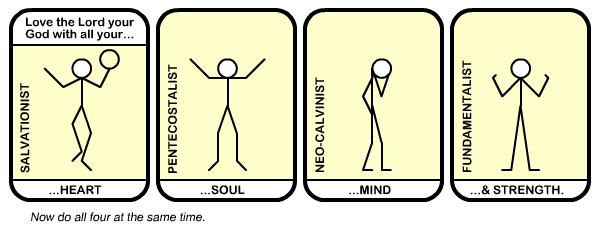For College I was asked to write a statement on Community and youth work practice.
I would suggest that there can be no effective youth work without community. Young people live in geographical communities, operate in groups or tribes that are mirco-communities, are influenced by the macro community of the global village, and spend time forming virtual communities in cyber space. They are the product of community, shaped by community, and socialized by community. Some might call this an anthropological reason for having community at the center of your practice and to ignore the community dimension of young peoples lives and its influence is a dis-service to the young people you work with. Yet there is a theological reason why community should be core to your practice, as without it community as the center of practice, it is a dis-service to God in whose image we are made. An image, which is one of community. The God we serve is a tri-une God, and the trinity is an image of the perfect community, Father, Son and Spirit all held in balance all One, if are calling young people towards God then we are calling them towards community.
What is our mission? At it’s heart youthwork is about change, change on a personal level, a group level and a societal level, captured well by the words of Christ “I have come that you may have life and life in all its fullness� Therefore as well as the theological and anthropological reasons stated there is a practical reason; namely change comes via community and is needed in communities.
M. Scott Peck Author of The Road Less Traveled argues strongly for community writing: There can be no vulnerability without risk; there can be no community without vulnerability; there can be no peace, and ultimately no life, without community.
Community is central to the process of change for a number of reasons.
Self understanding is an important first part of the process of youth work and the start point for understanding ourselves is community. As others reflect back to us a truer image of ourselves than we may have we journey towards a fullness of life. Therefore engendering a sense of community with the young people we work with engenders life.
As agents of change we cannot achieve changes by ourselves, if we are to work for fullness of life for all there is an inevitable community dimension to our work. I would suggest that if our own fullness of life hinders another from their fullness we are not truly living in the light. Therefore to work for change with, for and in communities, at local, national, global or virtual must be a paramount priority. Not only will the impact of these changed communities help those that are members have a greater fullness of life, but also those who engage in the struggle of changing these communities will also experience at greater fullness of life.
Finally because we are made in God’s image, humanity longs for a sense of communitas. Communitas is an intense community spirit, the feeling of great social equality, solidarity, and togetherness Thunder on the Hill movies
. Even the hermits of old sought this equality and justice for others, and togetherness with their creator as they retreated to desolate places to pray. The desire for Communitas is more prevalent as a characteristic when people experience liminality. ie when they are undergoing a period of change when the resources they have relied on in the past are called into question. If this desire for communitas lies latent at the core of humanity and comes to the fore during liminality, then it speaks of God’s image in whom we are made, and provides the key to forming lasting, real, dynamic relationships of change, and hope.

